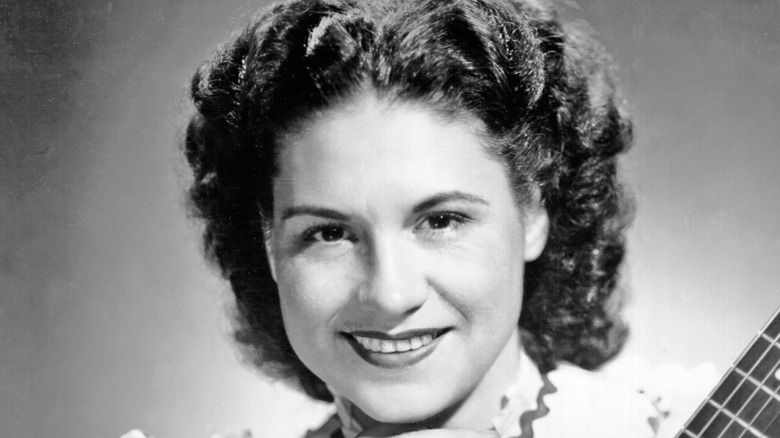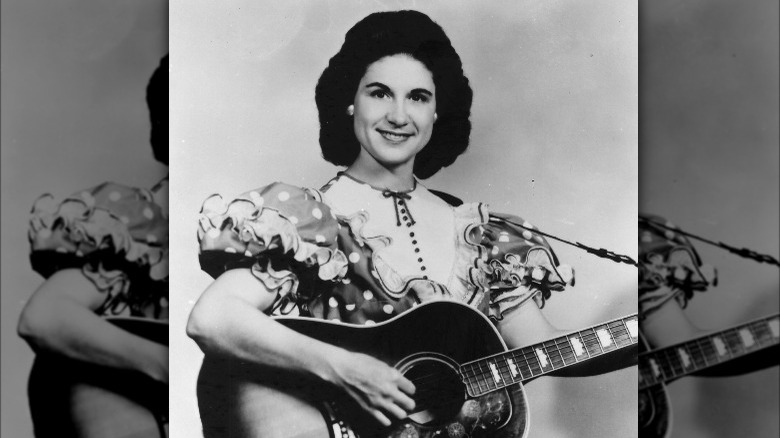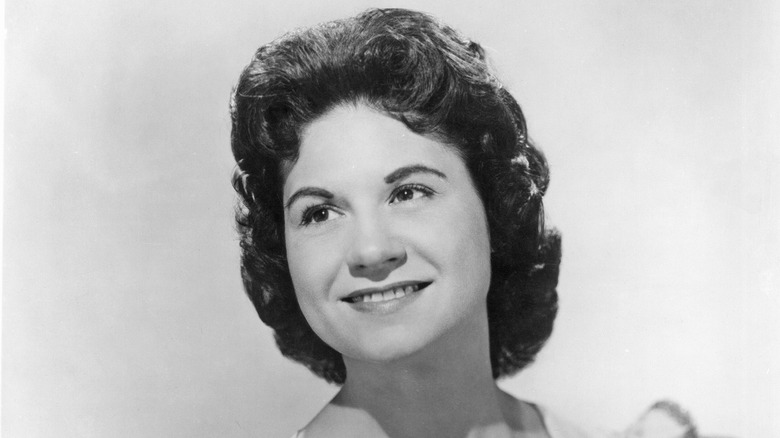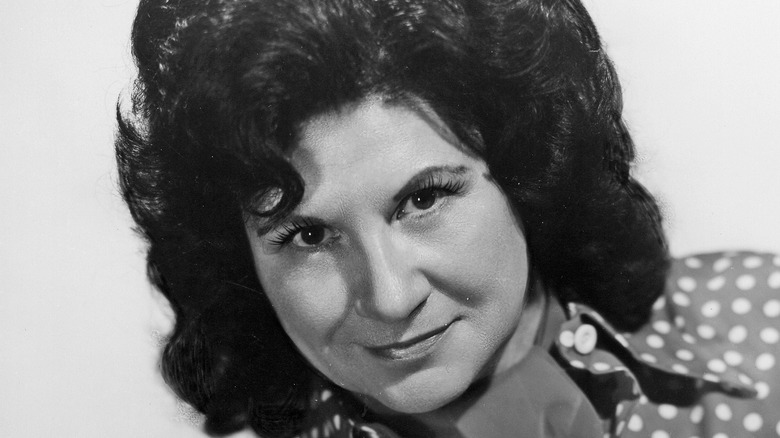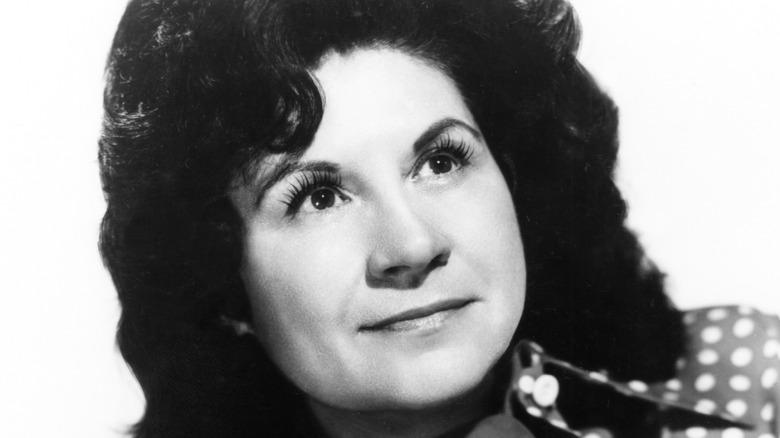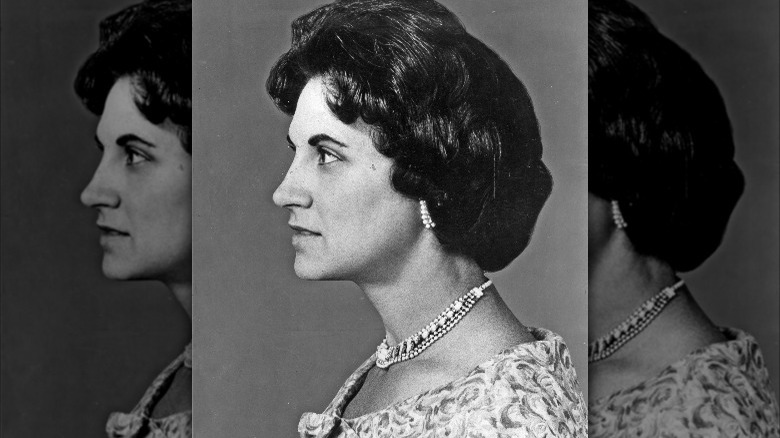The Untold Truth Of Country Music Legend Kitty Wells
Kitty Wells changed country music forever, but even country fans may not know her real name. Wells was born Ellen Muriel Deason on August 30, 1919 in Nashville, Tennessee, as noted by The New York Times. She grew up in an environment merry with music, listening to the Grand Ole Opry and her father playing folk songs on the guitar. Like many major country artists of the mid-20th century, Wells began by singing gospel music.
Although she sang from a young age, she did not score any hits until after the age of 30. Even so, she had a 27-year career in music. She recorded 84 singles for the country charts, and 38 reached the Top 10, including one single that many say made history and changed country music forever. She ultimately paved the way for major artists such as Loretta Lynn and Dolly Parton. Song publisher Fred Rose once declared Wells the "Queen of Country Music" — and for good reason.
Prior to her breakthrough, Kitty Wells tasted success but planned to quit music
Raised in a musical family, Kitty Wells had been making music for most of her life, as noted by The New York Times. She began playing the guitar at age 14, and made her debut at the age of 17 on WSIX in Nashville, Tennessee. At the radio station, she met her future husband, Johnnie Wright, a cabinetmaker and fellow aspiring country music star, per AllMusic. The couple married the following year and formed a short-lived group with Wright's sister. The trio didn't last long, but Wells would regularly perform with Wright's duo with Jack Anglin, called Johnny and Jack.
By the time she found fame at age 33, Wells had been planning to quit her music career to devote herself fully to her traditional roles as wife and mother. Still, she had already tasted country music success through appearances on major radio hoedowns such as "Louisiana Hayride" and the Grand Ole Opry broadcast. She had even briefly worked as a DJ in Shreveport, Louisiana, under the stage name the Little Rag Doll. One day, Wright suggested she use the name "Kitty Wells," a reference to the lyrics of an old folk ballad.
Kitty Wells' breakthrough track was a response to a Hank Thompson hit
In 1952, a 33-year-old Kitty Wells reluctantly agreed to record a song for Decca Records, titled "It Wasn't God Who Made Honky Tonk Angels," per Wide Open Country. "I wasn't expecting it to make a hit," she told the Nashville Scene in 1999 (via The New York Times). "I just thought it was another song." She agreed to do it largely to secure the union-scale wage of $125 for the session, which would help support her family.
The song was a response to Hank Thompson's No. 1 hit "Wild Side of Life," in which Thompson laments a young woman for giving up her role as a housewife in favor of "the night life." "I didn't know God made honky tonk angels/I might have known you'd never make a wife," he sings (via Genius).
Thompson's song outraged many young women at the time, and Wells' response gave voice to that distaste. "As I sit here tonight, the jukebox playin'/The tune about the wild side of life," she sings (via The New York Times), "It's a shame that all the blame is on us women/It's not true that only you men feel the same/From the start most every heart that's ever broken/Was because there always was a man to blame."
'It Wasn't God Who Made Honky Tonk Angels' sparked controversy
"It Wasn't God Who Made Honky Tonk Angels" marked Kitty Wells' breakthrough, and is considered by some to be an early feminist anthem that broke down barriers for women in country music and beyond. Naturally, the pioneering nature of the track led to significant critical acclaim and plenty of backlash.
According to The New York Times, the NBC radio network banned "It Wasn't God Who Made Honky Tonk Angels" for being too "suggestive." Grand Ole Opry officials also initially banned Wells from performing the track, but later backtracked due to the song's popularity and Wells' palatable, traditional image.
"[Wells] sang of 'Honky Tonk Angels,' but no one would have ever mistaken her for one," Mary A. Bufwack and Robert K. Oermann wrote in the book "Finding Her Voice: Women in Country Music, 1800-2000," adding, "She was always proper, always dignified. She dressed in prewar gingham instead of pantsuits, flamboyant Western garb or satin costumes."
Kitty Wells earned a prestigious place in country music history
"It Wasn't God Who Made Honky Tonk Angels" led Kitty Wells to become the first female artist to top the Billboard country charts, per The New York Times. The song spent six weeks at the top of the country charts before crossing over to the pop chart, another historic achievement for women in country music.
The song's success proved that female artists could perform alongside, and even outperform, male artists in the country music scene. As a result, record executives in Nashville, Tennessee, began offering recording contracts to female artists.
Countless opportunities and accolades followed Wells' initial breakthrough. In 1968, she had her own syndicated television show. In 1974, she recorded a country-rock album along with members of the Allman Brothers and the Marshall Tucker Band. In 1976, she was elected to the Country Music Hall of Fame. And in 1991, Wells became the third artist — and first female artist — in country music history to be awarded a Lifetime Achievement Award from the National Academy of Recording Arts and Sciences. The only previous winners from the country music scene were Roy Acuff and Hank Williams.
Kitty Wells' recordings were lost in the 2008 Universal fire
On June 1, 2008, a fire began in the backlot of Universal Studios Hollywood and spread to a warehouse known as Building 6197, as reported by The New York Times. Many knew the building as a "video vault," but lesser known was that the warehouse held a library of Universal Music Group's most historically significant recordings. The fire took close to 24 hours to quell, and it destroyed thousands of original UMG masters. Several of the recordings were by country music artists, including Kitty Wells.
Wells died four years later, on July 16, 2012, at the age of 92, as reported by The New York Times. She died at her home in Madison, Tennessee, due to complications of a stroke. Her husband of more than 70 years, Johnnie Wright, had died the previous year. At the time of Wells' death, she was survived by a son, a daughter, eight grandchildren, 12 great-grandchildren, and five great-great-grandchildren. A decade beyond her death and the destruction of her original masters, Wells' legacy lives on in the country music world.
